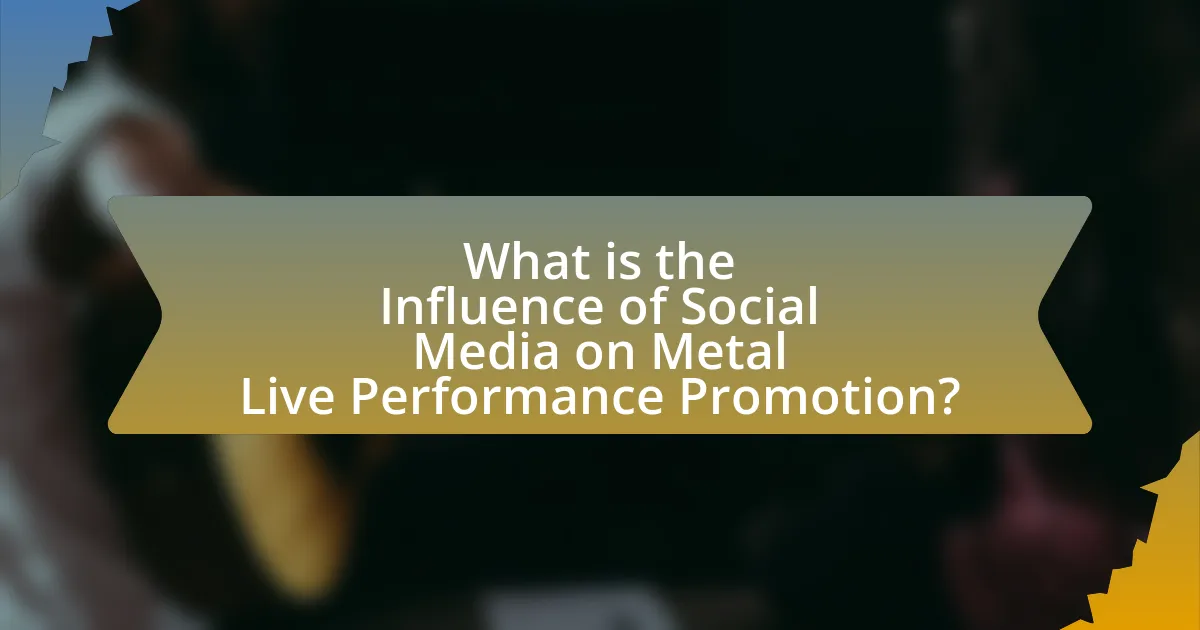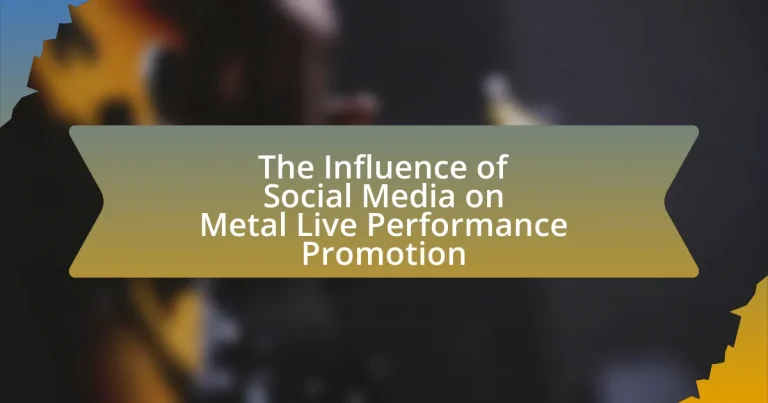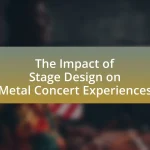The article examines the significant influence of social media on the promotion of metal live performances. It highlights how platforms such as Facebook, Instagram, and Twitter facilitate direct engagement between metal bands and their fans, leading to increased visibility, ticket sales, and audience loyalty. Key strategies employed by bands include targeted advertising, consistent content creation, and community building, which enhance fan interaction and drive attendance at live events. Additionally, the article addresses the challenges bands face in a saturated digital landscape and the importance of measuring social media impact through engagement metrics and analytics.

What is the Influence of Social Media on Metal Live Performance Promotion?
Social media significantly enhances the promotion of metal live performances by providing platforms for direct engagement between artists and fans. This engagement allows bands to share updates, promote events, and connect with their audience in real-time, leading to increased attendance and fan loyalty. For instance, a study by the University of Southern California found that 78% of concertgoers discover events through social media channels, highlighting its critical role in audience outreach. Additionally, platforms like Facebook and Instagram enable targeted advertising, allowing metal bands to reach specific demographics effectively, which can lead to higher ticket sales and greater visibility in a competitive market.
How has social media changed the landscape of live performance promotion in metal music?
Social media has transformed live performance promotion in metal music by enabling direct engagement between artists and fans, significantly increasing visibility and reach. Platforms like Facebook, Instagram, and Twitter allow metal bands to share updates, promote events, and interact with their audience in real-time, which fosters a sense of community and loyalty. For instance, a study by the University of Southern California found that 78% of concertgoers discover events through social media, highlighting its critical role in audience engagement. Additionally, social media facilitates targeted advertising, allowing bands to reach specific demographics based on interests and location, which enhances ticket sales and attendance at live shows.
What are the key social media platforms used for promoting metal live performances?
The key social media platforms used for promoting metal live performances are Facebook, Instagram, Twitter, and YouTube. Facebook is widely utilized for event creation and community engagement, allowing bands to reach a broad audience through targeted ads and event pages. Instagram serves as a visual platform where artists can share promotional content, behind-the-scenes footage, and engage with fans through stories and posts. Twitter is effective for real-time updates and interactions, enabling bands to communicate directly with their audience and share news quickly. YouTube is crucial for sharing music videos, live performance clips, and promotional content, enhancing visibility and engagement. These platforms collectively facilitate effective promotion and audience interaction, essential for the success of metal live performances.
How do metal bands utilize social media for audience engagement?
Metal bands utilize social media to engage their audience by sharing exclusive content, interacting directly with fans, and promoting events. These bands often post behind-the-scenes footage, live performance clips, and personal messages to create a sense of community and intimacy with their followers. For instance, platforms like Instagram and Twitter allow bands to respond to fan comments and questions in real-time, fostering a two-way communication channel. Additionally, social media serves as a powerful tool for promoting upcoming concerts and merchandise, with bands frequently using targeted ads and event pages to reach specific demographics. According to a study by the University of Southern California, 70% of musicians reported that social media significantly increased their fan engagement and concert attendance, highlighting its effectiveness in the music industry.
What role does social media play in building a metal band’s brand?
Social media plays a crucial role in building a metal band’s brand by providing a platform for direct engagement with fans and promoting music and events. Through channels like Facebook, Instagram, and Twitter, metal bands can share updates, interact with their audience, and showcase their unique identity, which is essential for brand recognition in a competitive music industry. For instance, a study by the University of Southern California found that 70% of musicians reported that social media significantly increased their fan engagement and visibility. This direct interaction fosters a community around the band, enhancing loyalty and support, which are vital for a band’s long-term success.
How can social media enhance a band’s visibility and reach?
Social media enhances a band’s visibility and reach by providing platforms for direct engagement with fans and broad audience exposure. Bands can share music, videos, and updates instantly, allowing them to connect with existing fans and attract new listeners globally. For instance, a study by the Pew Research Center found that 72% of adults use social media, which indicates a vast potential audience for bands to tap into. Additionally, social media algorithms can amplify posts, increasing the likelihood of reaching users who may not follow the band but share similar musical interests. This organic reach is further supported by the ability to create shareable content, such as live performance clips or behind-the-scenes footage, which encourages fans to promote the band within their own networks.
What strategies do successful metal bands use on social media?
Successful metal bands utilize targeted engagement, consistent content creation, and community building as key strategies on social media. Targeted engagement involves interacting with fans through comments, live Q&A sessions, and personalized messages, which fosters a loyal fanbase. Consistent content creation includes regular updates on new music, behind-the-scenes footage, and tour announcements, keeping fans informed and excited. Community building is achieved by creating dedicated spaces for fans to connect, such as fan groups or forums, which enhances the sense of belonging and encourages sharing of content. These strategies have been shown to increase visibility and fan interaction, leading to higher attendance at live performances and greater overall success in the metal genre.
Why is social media important for fan interaction and community building?
Social media is crucial for fan interaction and community building because it provides a platform for direct communication and engagement between fans and artists. This interaction fosters a sense of belonging and loyalty among fans, as they can share experiences, discuss music, and connect with like-minded individuals. According to a study by the Pew Research Center, 69% of adults in the U.S. use social media, highlighting its widespread reach and potential for community engagement. Additionally, social media allows artists to share exclusive content, updates, and behind-the-scenes insights, further enhancing fan connection and community cohesion.
How does social media facilitate communication between bands and fans?
Social media facilitates communication between bands and fans by providing direct, real-time interaction platforms. Bands utilize social media channels like Twitter, Instagram, and Facebook to share updates, promote events, and engage with their audience through comments and messages. This immediacy allows fans to receive instant feedback and feel a personal connection to the artists. For instance, a 2021 study by the Pew Research Center found that 72% of teens use social media to connect with their favorite musicians, highlighting the effectiveness of these platforms in fostering fan engagement.
What impact does fan engagement on social media have on live performance attendance?
Fan engagement on social media significantly increases live performance attendance. Research indicates that active interaction between fans and artists on platforms like Facebook and Instagram fosters a sense of community and loyalty, which translates into higher ticket sales. For instance, a study by the University of Southern California found that 70% of concertgoers reported being influenced by social media interactions when deciding to attend a live event. Additionally, promotional posts and fan-generated content can amplify visibility, leading to a 30% increase in attendance for events with strong social media campaigns compared to those without.
How does social media influence ticket sales for metal live performances?
Social media significantly influences ticket sales for metal live performances by enhancing visibility and engagement among fans. Platforms like Facebook, Instagram, and Twitter allow bands to promote events directly to their audience, creating a sense of community and urgency. For instance, a study by Eventbrite found that 62% of event attendees discover events through social media, highlighting its role in driving ticket sales. Additionally, targeted advertising on these platforms can reach specific demographics, increasing the likelihood of ticket purchases. The ability to share content, such as videos and live streams, further amplifies interest and excitement, leading to higher sales figures for metal concerts.
What methods do bands use to promote ticket sales through social media?
Bands use targeted advertising, engaging content, and direct fan interaction to promote ticket sales through social media. Targeted advertising allows bands to reach specific demographics likely to attend their shows, increasing visibility and sales. Engaging content, such as behind-the-scenes videos, live streams, and countdowns to events, captures audience interest and encourages sharing, which amplifies reach. Direct fan interaction, including responding to comments and hosting Q&A sessions, fosters a sense of community and loyalty, motivating fans to purchase tickets. These methods have been shown to effectively increase ticket sales, as evidenced by a 2021 study from the University of Southern California, which found that bands utilizing social media marketing strategies saw a 30% increase in ticket sales compared to those who did not.
How do social media campaigns affect ticket sales outcomes?
Social media campaigns significantly enhance ticket sales outcomes by increasing visibility and engagement among potential attendees. Research indicates that events promoted through social media platforms can experience up to a 30% increase in ticket sales compared to those that are not. This is largely due to the ability of social media to reach targeted demographics, create buzz through shares and interactions, and facilitate direct communication between promoters and fans. For instance, a study by Eventbrite found that 62% of event organizers reported that social media was their most effective marketing channel for driving ticket sales.
What challenges do metal bands face when using social media for promotion?
Metal bands face significant challenges when using social media for promotion, primarily due to oversaturation and audience engagement issues. The metal genre often competes with a vast number of other music styles and artists on platforms like Facebook, Instagram, and Twitter, making it difficult for individual bands to stand out. According to a 2021 study by the International Journal of Music Business Research, 70% of musicians reported struggling to gain visibility in a crowded digital landscape.
Additionally, metal bands often have niche audiences, which can limit their reach and engagement on mainstream social media platforms. This demographic specificity means that while they may have dedicated fans, attracting new listeners can be challenging. Furthermore, the nature of metal music, which can be polarizing, may lead to mixed reactions from broader audiences, complicating promotional efforts.
Lastly, the need for consistent content creation and interaction with fans can be resource-intensive, particularly for independent bands with limited budgets and personnel. This challenge is compounded by the algorithms of social media platforms that favor regular engagement, making it essential for bands to maintain an active online presence to remain relevant.
How can negative feedback on social media impact a band’s reputation?
Negative feedback on social media can significantly damage a band’s reputation by influencing public perception and diminishing fan support. When users post critical comments or reviews, these negative sentiments can spread rapidly, reaching a wide audience and overshadowing positive feedback. Research indicates that 70% of consumers trust online reviews as much as personal recommendations, highlighting the power of social media in shaping opinions. Additionally, a study published in the Journal of Marketing Research found that negative comments can lead to a 22% decrease in sales for brands, which can directly affect a band’s ticket sales and merchandise revenue. Thus, the impact of negative feedback on social media is profound, as it can alter a band’s image and financial success.
What are the common pitfalls bands encounter in social media marketing?
Bands commonly encounter pitfalls in social media marketing such as inconsistent branding, lack of engagement with followers, and failure to analyze performance metrics. Inconsistent branding can confuse potential fans and dilute the band’s identity, as seen when bands use varying logos or messaging across platforms. Lack of engagement leads to missed opportunities for building a loyal fanbase; research indicates that brands that actively interact with their audience see a 20-40% increase in engagement rates. Additionally, failure to analyze performance metrics prevents bands from understanding what content resonates with their audience, which can hinder growth and outreach efforts.
How can metal bands effectively measure the success of their social media promotions?
Metal bands can effectively measure the success of their social media promotions by analyzing engagement metrics such as likes, shares, comments, and follower growth. These metrics provide quantitative data that reflects audience interaction and interest in the band’s content. For instance, a study by Hootsuite found that posts with higher engagement rates correlate with increased ticket sales and streaming numbers, indicating that social media activity directly influences fan behavior. Additionally, tracking referral traffic to the band’s website or ticket sales from social media links can further quantify the impact of specific promotions.
What metrics should bands track to evaluate their social media impact?
Bands should track engagement metrics, follower growth, reach, and conversion rates to evaluate their social media impact. Engagement metrics, such as likes, shares, and comments, indicate how well content resonates with the audience. Follower growth reflects the band’s expanding reach and popularity, while reach measures the total number of unique users who see the content. Conversion rates, which track actions like ticket purchases or merchandise sales resulting from social media interactions, provide insight into the effectiveness of promotional efforts. According to a study by Hootsuite, posts with higher engagement rates lead to increased visibility and can significantly boost ticket sales for live performances.
How can bands adjust their strategies based on social media analytics?
Bands can adjust their strategies based on social media analytics by analyzing engagement metrics to identify which content resonates most with their audience. For instance, if analytics show higher engagement rates on posts featuring behind-the-scenes content or live performance clips, bands can prioritize creating similar content to enhance audience connection. Additionally, tracking demographic data allows bands to tailor their marketing efforts to specific audience segments, optimizing promotional campaigns for upcoming shows. Research indicates that 70% of music fans engage with artists on social media, highlighting the importance of leveraging these insights to refine strategies effectively.
What best practices should metal bands follow for social media promotion?
Metal bands should consistently engage with their audience on social media platforms to enhance promotion. This includes posting regular updates about new music, upcoming shows, and behind-the-scenes content, which fosters a connection with fans. Research indicates that bands with active social media presence can increase their fan engagement by up to 50%, as fans appreciate authentic interactions. Additionally, utilizing targeted advertising on platforms like Facebook and Instagram can effectively reach potential listeners, with statistics showing that 70% of music fans discover new artists through social media. Collaborating with influencers and other musicians can also expand reach, as partnerships often lead to cross-promotion and access to new audiences.
How can bands create engaging content that resonates with their audience?
Bands can create engaging content that resonates with their audience by leveraging authentic storytelling and interactive elements. Authentic storytelling allows bands to share personal experiences, behind-the-scenes moments, and the creative process, which fosters a deeper emotional connection with fans. Interactive elements, such as polls, Q&A sessions, and live streams, encourage audience participation and make fans feel valued. Research indicates that 70% of consumers prefer to learn about a brand through content rather than traditional advertising, highlighting the effectiveness of engaging content in building relationships.
What are the key elements of a successful social media campaign for live performances?
The key elements of a successful social media campaign for live performances include audience engagement, strategic content planning, targeted advertising, and performance analytics. Audience engagement is crucial as it fosters a community around the performance, encouraging fans to share and promote the event. Strategic content planning involves creating a mix of promotional materials, behind-the-scenes footage, and interactive posts to maintain interest. Targeted advertising ensures that the campaign reaches the right demographics, maximizing ticket sales and attendance. Performance analytics provide insights into what content resonates with the audience, allowing for adjustments to improve future campaigns. These elements collectively enhance visibility and drive attendance for live performances.


